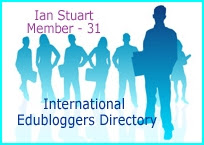The day started even earlier than planned. That's why the agenda is written on to remind me.
During day 1 I had meet and spent some time with the group of teachers I was working with.
My group are from left to right are Alinazim from Azerbaijan, Tahmeena from Pakistan, Saba from UAE and Kara from Sweden (Below). Unfortunately Jenny from Bolivia (and her translator, Daniela) didn’t make it to Washington.
These were all amazing educators in their own right. They had already won the national and regional forum competitions for their Virtual Classroom Tours of there projects.
We are called SERC 7. The name is from our visit today on our Learning Excursion. We were group 7 heading to Smithsonian Environmental Research Centre – SERC.
First though the was a keynote from Microsoft’s VP for Education, Anthony Salcito. Ollie Bray has a great post on this and it was a very powerful mood setter for the event.
Off to buses with our groups. Once we had found them…
The Learning Excursions were a range of information gathering trips. Some groups went to the Zoo others went to the Gardens. We one of 8 groups that went to SERC.
SERC is about an hour outside Washington. In fact its in another state, Maryland. We had a stunning drive out of the city on a beautiful clear autumn day. Due to the time in travelling we had lunch on the buses.
At SERC we had a background talk on what the work i that's done. One thing that really caught my attention was the Distance learning programme.
SERC have a mobile video conference (VC) broadcast unit. This means they can broadcast to any internet connected classroom in the world. Having used VC extensively I know that is is a very powerful media. Much more powerful than TV or YouTube as the pupils involved can ask questions and interact. Something more schools could take advantage of.
We were give several options to go and look at; from building an Remotely Operated Vehicle to getting out in a canoe into the bay. The group decided we would split up and cover as many of the activities as possible.
I attended a topic called Environment Builders. This, it turned out, was looking at demonstrations and doing a few activities looking at how animals have an affect on the environment.
For example, we used the SERC (Soon to be) downloadable resources on jellyfish body design to conduct an experiment about the affect that different body types have on the water temperature layering.
Then a sampling exercise to look at how the Scientists estimate what the populations are in the bay. Using mixed beans and statistics
and a final exercise on the affect of different types of plants and animals have on the amount of light.
We I liked about these exercises was that none of them required high tech equipment or resources but demonstrated real effects and phenomena in very real and practical ways.
It was then a few minutes breathing space as the groups gathered and I could actually take in just how beautiful the environment was that day….
…but no time to dawdle, it was back on the coach to talk with our groups as we headed back into Washington. This was a slower run as we hit traffic. Therefore we were late for our next mentor session.
An Introduction to Coaching
Coaching and Mentoring is something we have been doing on Islay for several years. In fact only a few weeks before Mathew Boyle had done some work with our senior pupils on this.
To me this something that is a vital skill for all learners. A shared understanding of the language and process of learning and be able to have positive conversations about learning.
I was surprised at how many of these great educators had not done any courses on this or were even aware of it.
On the timetable it shows that we had sometime………. actually we had homework. We had to go to our team members and apply the skills we had jut been looking at.
The feedback from lots of the Mentors was that teams got a lot out of the coaching conversations. In fact they wish they had had the conversations right at the start of the event as they made them think. Some even restructured the talks they gave because of the Coaching conversations. That's the power of these.
In the evening I decided to go with the group of mentors for dinner at Old Ebbit’s Grill rather than go with the national groups for dinner. I wanted to get to know people outside the formal sessions. This is exactly what happened. About 14 of us had a fantastic meal and amazing conversations about all sorts of things.
This was also the first time I had the 2 bottles of Whisky with me to share. A Bottle of Bowmore 18 year cask strength and a 16 year old Jura, also cask strength. The idea was that they would go further.
Everyone was very impressed. In fact our waiter for the evening, Kevin, was allowed to taste them. He had the most amazing descriptions of them for the group. A natural born poet I feel.
Conversations continued back at the hotel in all sorts of ways and in all sorts of topics ……….















